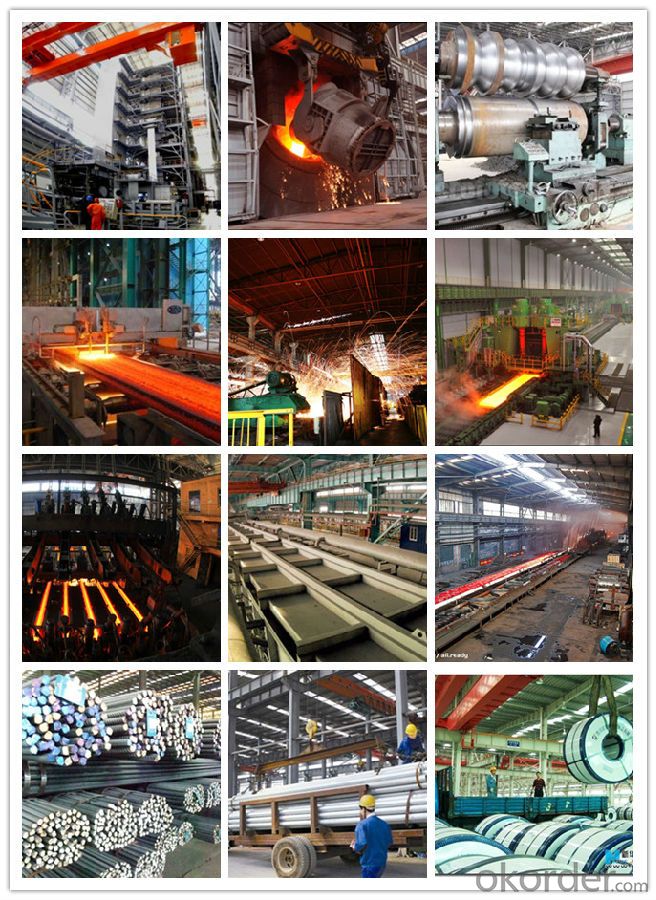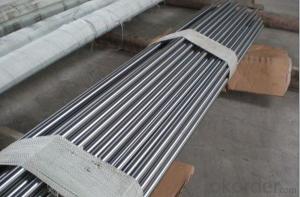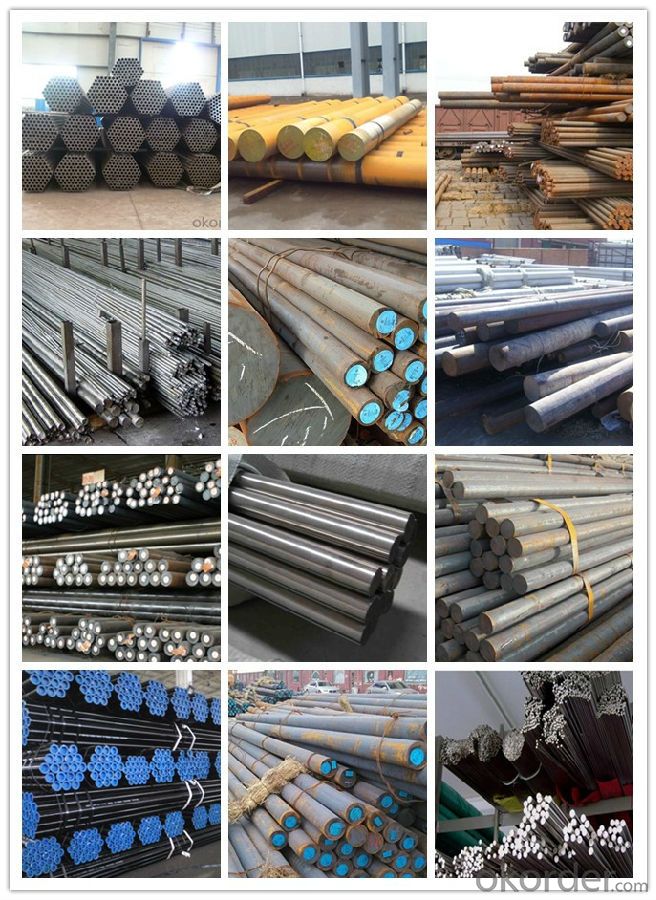Deformed Steel Bar HRB400 Construction Rebar
- Loading Port:
- China main port
- Payment Terms:
- TT OR LC
- Min Order Qty:
- 30 m.t.
- Supply Capability:
- 10000 m.t./month
OKorder Service Pledge
OKorder Financial Service
You Might Also Like
Item specifice
Product information:
| Commodity: | High quality hot rolled ribbed bar, Steel rebar, Deformed bars, Deform rebar |
| Standard & Grade: | GB1499-98 : HRB335,HRB400,HRB500 |
| BS4449-1997 : GR460B,GRB500B | |
| CAN/CSA-G30.18-M92 : 400W | |
| AS/NZS4671-2001 : GR300E, GR500E | |
| JIS G3112-2010 : SD345,SD390,SD490 | |
| ASTM A615 : Gr.40, Gr.60 | |
| DIN488-1984 : BST500 | |
| KS D 3504 : SD400 | |
| Diameter: | 6mm - 50mm |
| Length: | 6m,9m,12m |
| Packing: | Bundle packing |
| Origin: | China |
| Application: | Construction,Road,Machinery processing,Welding fields. |
| Delivery time: | 10-25 days |
| Shipment: | By bulk vessel or Container |
| Documents: | Mill Test Certificate,Commercial Invoice,Packing List,Certificate of Origin |
Product show
Workshop show

Shipping
1. FedEx/DHL/UPS/TNT for samples, Door-to-Door;
2. By Air or by Sea for batch goods, for FCL; Airport/ Port receiving;
3. Customers specifying freight forwarders or negotiable shipping methods!
Delivery Time: 3-7 days for samples; 5-25 days for batch goods.
Payment Terms
1.Payment: T/T, L/C, Western Union, MoneyGram,PayPal; 30% deposits; 70% balance before delivery.
2.MOQ: 1pcs
3.Warranty : 3 years
4.Package Informations: 1) EXPORT, In 20 feet (GW 25 ton) or 40 feet Container (GW 25 ton)
2)as customer's requirement
Why choose us?
(1) The leading exporter in China special steel industry.
(2) Large stocks for various sizes, fast delivery date.
(3) Good business relationship with China famous factories.
(4) More than 7 years steel exporting experience.
(5) Good after-sales service guarantee.
- Q:How does special steel contribute to the renewable energy sector?
- Special steel plays a crucial role in the renewable energy sector by enabling the construction of highly efficient and durable renewable energy infrastructure. It is used in the manufacturing of wind turbine components, solar panels, and hydroelectric power systems, among others. Its exceptional strength, corrosion resistance, and ability to withstand extreme conditions make it ideal for withstanding harsh weather and environmental factors. Additionally, special steel helps optimize energy conversion and transmission, ultimately improving the overall efficiency and reliability of renewable energy systems.
- Q:What are the key differences between special steel and tool steel?
- Special steel and tool steel possess distinct characteristics and uses. Here are the main disparities: 1. Composition: Special steel encompasses a diverse range of steel alloys tailored for specific applications. Stainless steel, high-strength alloy steel, and heat-resistant steel are some examples. In contrast, tool steel refers to a particular type of special steel designed for tool, die, and mold production. Tool steel typically contains higher levels of carbon and other alloying elements like chromium, vanadium, or tungsten, which enhance its hardness, wear resistance, and toughness. 2. Hardness and wear resistance: Tool steel stands out for its exceptional hardness and wear resistance, making it ideal for cutting, shaping, and forming materials. It can endure high temperatures and resist deformation, ensuring the longevity of tools and dies. On the other hand, special steel may not possess the same level of hardness and wear resistance as tool steel. Its properties vary depending on the specific alloy and application. Special steel alloys may prioritize other properties such as corrosion resistance or strength. 3. Manufacturing processes: Tool steel often undergoes specialized manufacturing processes like hot working, cold working, or heat treatment to achieve the desired properties. The production of tool steel involves precise temperature control and cooling rates to attain the necessary hardness and toughness. In contrast, special steel may undergo various manufacturing processes depending on the desired properties, such as forging, casting, or heat treatment. 4. Applications: Tool steel finds primary application in the production of tools, dies, and molds used for cutting, shaping, and forming materials. Industries such as automotive, aerospace, and machinery commonly utilize tool steel. Conversely, special steel has a wide range of applications depending on the specific alloy and properties. It can be employed in industries such as construction, energy, and manufacturing, where specific properties like corrosion resistance, heat resistance, or strength are required. To summarize, the key distinctions between special steel and tool steel lie in their composition, hardness, wear resistance, manufacturing processes, and applications. While special steel encompasses various steel alloys with specific properties, tool steel is a specific type of special steel tailored for tooling applications. Tool steel is characterized by its exceptional hardness and wear resistance, making it suitable for cutting and shaping materials. On the other hand, special steel can possess a broader range of properties depending on the specific alloy and application.
- Q:Can special steel be used for luxury goods?
- Yes, special steel can definitely be used for luxury goods. Special steel, known for its exceptional durability, strength, and unique properties, can be utilized in the production of high-end luxury goods such as watches, jewelry, knives, and even high-performance vehicles. Its superior quality and aesthetic appeal make it an ideal choice for manufacturers seeking to create luxurious and exclusive products.
- Q:What is the impact strength of special steel?
- The impact strength of special steel is high, making it resistant to fractures or breaking under high impact or sudden forces.
- Q:How does special steel contribute to reducing product rejection rates in quality control?
- Special steel contributes to reducing product rejection rates in quality control by providing superior strength, durability, and resistance to wear and tear. These properties enable the production of high-quality components and eliminate common defects such as distortion, cracking, or premature failure. Additionally, special steel's precise composition and manufacturing processes ensure consistency and accuracy in the final products, reducing the likelihood of manufacturing errors and subsequent rejection during quality control inspections.
- Q:What is the cost difference between regular steel and special steel?
- The cost difference between regular steel and special steel can vary significantly depending on various factors such as the specific type of special steel, its grade, production techniques, and market demand. In general, special steel tends to be more expensive than regular steel due to its enhanced properties, specific alloy compositions, and specialized production processes. However, it is important to note that the cost difference may fluctuate and it is best to consult with suppliers or conduct market research for accurate and up-to-date pricing information.
- Q:What are the different electroplating techniques used for special steel?
- There are several electroplating techniques used for special steel, including electroless nickel plating, zinc plating, and chromium plating. Each technique offers unique benefits and properties that are tailored to the specific requirements of the special steel being plated.
- Q:What are the challenges in forming special steel?
- Several challenges arise when forming special steel due to its unique characteristics and properties. Some of the primary difficulties include: 1. The high melting point of special steels necessitates the use of specialized equipment and processes for heating and shaping the material. This can result in increased energy consumption and costs. 2. Special steels typically contain various alloyed elements to enhance their properties, such as strength, hardness, and corrosion resistance. However, controlling the alloy composition precisely can be challenging, as even minor variations can have a significant impact on the material's properties. 3. Certain special steels, such as tool steels, have a high carbon content to improve hardness and wear resistance. Unfortunately, this high carbon content makes the material more susceptible to cracking during forming processes like forging or rolling. Great care must be taken to prevent cracks and achieve the desired shape. 4. Special steels often require specific heat treatment processes, like quenching and tempering, to achieve the desired mechanical properties. These processes can be complex and require precise control of temperature, time, and cooling rates. Improper heat treatment can result in poor material performance or even structural failure. 5. Achieving the necessary surface finish and dimensional accuracy is crucial in applications where special steels are used, such as the aerospace or automotive industry. This can be challenging during forming operations, necessitating advanced tooling and precision machining techniques. 6. Forming special steels may require specialized equipment and expertise, such as high-pressure hydraulic presses, induction heating equipment, or vacuum furnaces. These specialized tools and processes add complexity and costs to the manufacturing process. Despite these challenges, forming special steels is vital in various industries that require their unique properties. Manufacturers continually invest in research and development to overcome these challenges and enhance the forming processes of special steels.
- Q:What are the different nuclear grades of special steel?
- The different nuclear grades of special steel refer to specific types of steel that are used in the nuclear industry to meet stringent requirements for safety, reliability, and performance. These grades are designed to withstand the harsh conditions of nuclear power plants and other nuclear facilities. There are several nuclear grades of special steel, each with its own unique characteristics and applications. Some of the commonly used grades include: 1. 304/304L stainless steel: This grade is widely used in nuclear applications due to its excellent corrosion resistance and high strength at elevated temperatures. It is often used in the construction of reactor vessels, heat exchangers, and piping systems. 2. 316/316L stainless steel: Similar to 304/304L, this grade offers superior corrosion resistance and high creep strength. It is commonly used in the construction of components exposed to corrosive environments, such as coolant systems, steam generators, and fuel handling equipment. 3. 321 stainless steel: This grade contains titanium, which stabilizes the steel against sensitization during welding. It is often used in nuclear applications where welding is required, such as piping systems and pressure vessels. 4. Duplex stainless steels: These grades, such as 2205 and 2507, offer a combination of high strength and excellent corrosion resistance. They are commonly used in nuclear applications involving highly corrosive environments, such as seawater-cooled systems and containment structures. 5. Low alloy steels: These steels, such as A533B and A508, are used in the construction of reactor pressure vessels due to their high strength and toughness. These grades are specifically designed to withstand the extreme conditions within a nuclear reactor. It is important to note that the selection of the appropriate nuclear grade of special steel depends on the specific application, considering factors such as temperature, pressure, corrosion resistance, and mechanical properties. These grades undergo rigorous testing and quality control measures to ensure their suitability for use in the nuclear industry.
- Q:What are the main applications of special steel in the textile industry?
- Special steel is used in the textile industry primarily for manufacturing textile machinery components. It is utilized to produce high-quality parts and tools like knitting needles, loom parts, and various cutting and shaping equipment. The strength, durability, and resistance to wear and tear of special steel make it an ideal material for these applications, ensuring the efficient and reliable operation of textile machinery in the industry.
1. Manufacturer Overview |
|
|---|---|
| Location | |
| Year Established | |
| Annual Output Value | |
| Main Markets | |
| Company Certifications | |
2. Manufacturer Certificates |
|
|---|---|
| a) Certification Name | |
| Range | |
| Reference | |
| Validity Period | |
3. Manufacturer Capability |
|
|---|---|
| a)Trade Capacity | |
| Nearest Port | |
| Export Percentage | |
| No.of Employees in Trade Department | |
| Language Spoken: | |
| b)Factory Information | |
| Factory Size: | |
| No. of Production Lines | |
| Contract Manufacturing | |
| Product Price Range | |
Send your message to us
Deformed Steel Bar HRB400 Construction Rebar
- Loading Port:
- China main port
- Payment Terms:
- TT OR LC
- Min Order Qty:
- 30 m.t.
- Supply Capability:
- 10000 m.t./month
OKorder Service Pledge
OKorder Financial Service
Similar products
New products
Hot products
Related keywords































